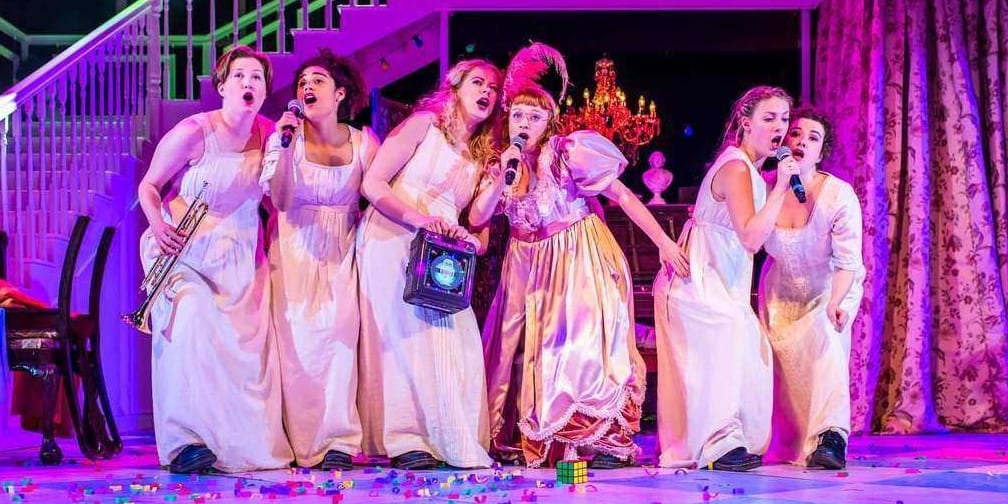It is a truth universally acknowledged that every review of a Jane Austen production must start with ‘it is a truth universally acknowledged’. Thanks to the wonderful source material and numerous high quality screen adaptations, Austen’s Pride and Prejudice is well known, well-loved and eminently quotable.
It is to the great credit of writer Isobel McArthur that she has taken on such a titan of English literature and created a version that is riotously good fun in a thoroughly modern way. The novel Pride and Prejudice tells the story of the interlocking lives of the Bennet family, the wealthy Mr Bingley, the even wealthier Mr Darcy and a host of other sharply drawn characters. The play Pride and Prejudice* (*sort of) tells the same story, albeit with a lot more disco lights, swearing and Chris De Burgh’s ‘The Lady in Red’. For all that this sounds like it promises carnage throughout, Pride and Prejudice* (*sort of) is actually a pretty straight retelling of the book. The novelty of hearing Mrs Bennet telling her daughters to ‘fuck off’ sotto voce in a broad northern accent is pretty much worth the price of admission alone, but there has been a missed opportunity here to create something truly revolutionary.
The original novel remains funny and highly perceptive of human nature. It doesn’t need ‘updating’ to remain relevant. Its characters and story have seeped so deeply into popular consciousness that McArthur could have subverted the audience’s expectations far more – creating something genuinely new – without alienating them. There are hints of what could have been. An unexpected and intriguing love interest is never fully explored, and ends up rather lost in the relentless drive for laughs. The play’s initial focus on the lives of servants rather than masters briefly raises the hope of a very different sort of Pride and Prejudice, but this swiftly ebbs away.
However, it would be churlish to focus on what might have been at the expense of the enjoyable reality. The all-female cast seamlessly switch character and gender with the addition of a tail coat, ball gown or thick regional accent. The whole first act belongs to Hannah Jarrett-Scott. She delivers good-natured idiocy as Mr Bingley, gleeful spite as Miss Bingley and genuine pathos as Elizabeth’s good friend Charlotte. Meghan Tyler’s Northern Irish Elizabeth is a foul mouthed hoot to spend time with, and her verbal sparring with McArthur – whether in the latter’s guise as Mrs Bennet or Mr Darcy – drives the second act. Tyler’s contemptuous rendition of ‘You’re So Vain’ (no prizes for guessing to whom) is a highlight of the show.
Indeed, modern songs are used throughout to good dramatic and comedic effect. There is no clinging white shirt to be seen, but McArthur has filled the production with numerous double entendres, which consistently hit their marks. While Austen’s perceptive writing rings as true today as it did 200 years ago, its relevance is further emphasised by the insertion of a few wry comments about today’s supposedly ‘enlightened times’ in McArthur’s script.
With its source material, sparkling cast and witty writing, Pride and Prejudice* (*sort of) could hardly miss and it doesn’t. It’s a relentlessly funny production, but with a bit more bravery and a more nuanced tone, it could have been a great one as well.

